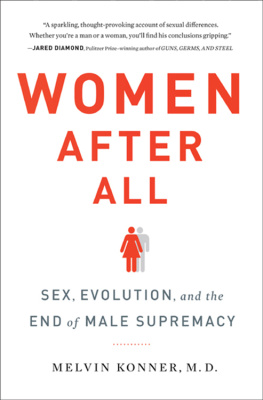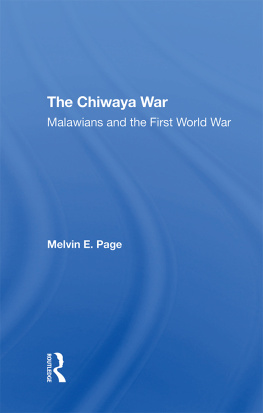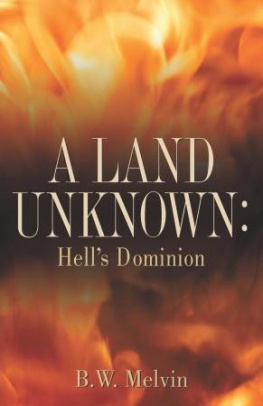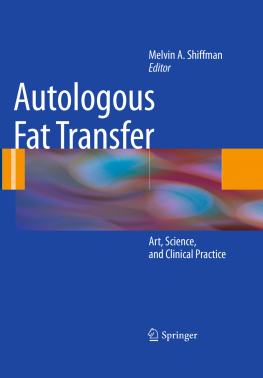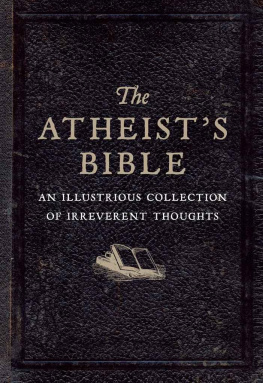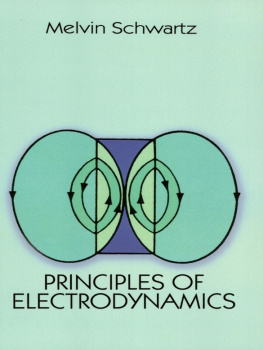Melvin Konner - The Jewish Body
Here you can read online Melvin Konner - The Jewish Body full text of the book (entire story) in english for free. Download pdf and epub, get meaning, cover and reviews about this ebook. genre: Religion. Description of the work, (preface) as well as reviews are available. Best literature library LitArk.com created for fans of good reading and offers a wide selection of genres:
Romance novel
Science fiction
Adventure
Detective
Science
History
Home and family
Prose
Art
Politics
Computer
Non-fiction
Religion
Business
Children
Humor
Choose a favorite category and find really read worthwhile books. Enjoy immersion in the world of imagination, feel the emotions of the characters or learn something new for yourself, make an fascinating discovery.

- Book:The Jewish Body
- Author:
- Genre:
- Rating:4 / 5
- Favourites:Add to favourites
- Your mark:
- 80
- 1
- 2
- 3
- 4
- 5
The Jewish Body: summary, description and annotation
We offer to read an annotation, description, summary or preface (depends on what the author of the book "The Jewish Body" wrote himself). If you haven't found the necessary information about the book — write in the comments, we will try to find it.
The Jewish Body — read online for free the complete book (whole text) full work
Below is the text of the book, divided by pages. System saving the place of the last page read, allows you to conveniently read the book "The Jewish Body" online for free, without having to search again every time where you left off. Put a bookmark, and you can go to the page where you finished reading at any time.
Font size:
Interval:
Bookmark:
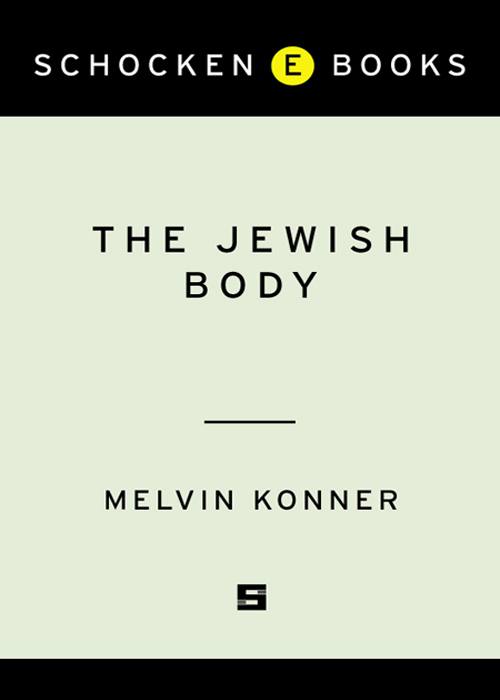

Jonathan Rosen, General Editor
Jewish Encounters is a collaboration between Schocken and Nextbook, a project devoted to the promotion of Jewish literature, culture, and ideas.

THE LIFE OF DAVID Robert Pinsky
MAIMONIDES Sherwin B. Nuland
BARNEY ROSS Douglas Century
BETRAYING SPINOZA Rebecca Goldstein
EMMA LAZARUS Esther Schor
THE WICKED SON David Mamet
MARC CHAGALL Jonathan Wilson
JEWS AND POWER Ruth R. Wisse
BENJAMIN DISRAELI Adam Kirsch
RESURRECTING HEBREW Ilan Stavans
THE JEWISH BODY Melvin Konner

THE CAIRO GENIZA Adina Hoffman and Peter Cole
MOSES Stephen J. Dubner
BIROBIJAN Masha Gessen
JUDAH MACCABEE Jeffrey Goldberg
YEHUDA HALEVI Hillel Halkin
NACHMAN/KAFKA Rodger Kamenetz
THE DAIRY RESTAURANT Ben Katchor
THE SONG OF SONGS Elena Lappin
THE AMERICAN SONGBOOK David Lehman
ABRAHAM CAHAN Seth Lipsky
THE EICHMANN TRIAL Deborah Lipstadt
THE LUBAVITCHER REBBE Jonathan Mahler
SHOW OF SHOWS David Margolick
GLCKEL OF HAMELN Daphne Merkin
MARSHALL MEYER Noga Tarnopolsky
A LIFE OF RASHI Elie Wiesel
MESSIANISM Leon Wieseltier
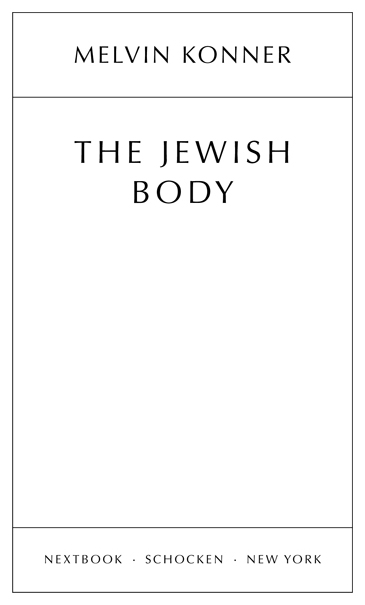
TO MY CHILDREN
Susanna, Adam, and Sarah
AND TO THEIRS
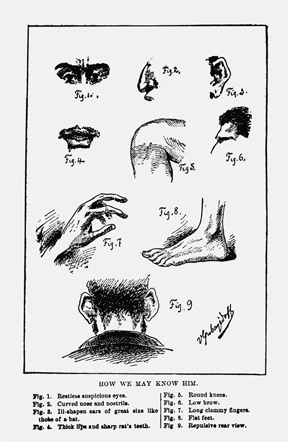
A nineteenth-century guide to identifying Jews.
Courtesy of the New York Public Library, Astor, Lenox, and Tilden Foundations. Used by permission of NYPL Photographic Services & Permissions.
T here is an illustration, an informative chart in fact, reprinted in a book called Kike! A Documentary History of Anti-Semitism in America. The chart was first published in 1888 in a book called The Original Mr. Jacobs, by the noted author Anon. It consists of nine small pen-and-ink drawings of body parts, with a helpful legend keyed to them. It is called How We May Know Him, and the legend says:
Fig. 1 Restless suspicious eyes. Fig. 2 Curved nose and nostrils. Fig. 3 Ill-shapen ears of great size like those of a bat. Fig. 4 Thick lips and sharp rats teeth. Fig. 5 Round knees. Fig. 6 Low brow. Fig. 7 Long clammy fingers. Fig. 8 Flat feet. Fig. 9 Repulsive rear view.
Figure 2 is a classic side view of the Jewish nose, Figure 4 displays the rats teeth between fleshy lips, Figure 7 looks more like a claw than a hand, and Figure 9, a rear view of the subject, shows just huge ears and a hairy neck. The Nazi view of Jewish anatomy would actually be much more subtle and scientific, but after all, it was half a century later and in the worlds most civilized nation, not that primitive backwater America. Still, although the Germans could build on work done in America and Europe throughout the nineteenth century, the foundations go much deeper, and it is part of this books purpose to trace them.
But it will do much more than depict the Jewish body from the viewpoint of its enemies. Since ancient times, Jews have had very clear ideas about their own bodies, and these ideasand the practices that went along with themchanged dramatically over the three millennia since the Jews became an identifiable people. Some had to do with regulating sex, some involved internalizing contemptuous images drawn by others, some were deliberate reactions against those images, and some involved what might be called a centuries-long compare-and-contrast exercise between the Jewish body and the body (if any) of the Jewish God.
Jews are known as the people of the book, but they have also been called the people of the body, and some of their most revered books through the ages have dealt extensively with the bodyhow and how not to change it, care for it, reproduce it, satisfy its insistent demands, bless and thank God for its myriad functions, and dispose of it after all those functions cease. The Hebrew Bible is full of messages about the body and twenty centuries of rabbinical interpretations of them have parsed them to the nth degree. The Jewish body during those centuries went from strong and warlike to weak and submissive and back to strong and warlike again, with momentous consequences for Jewish destiny.
As for Gods body, Jewish destiny was shaped by the Jews insistence that God didnt have one, yet their refusal to embody God was inextricably tied up with their views about their own bodies. The medieval mystic books of the Kabbalah tried to give God a body after all and scholars have argued over its meaning ever since. Jacob, who is Israel, wrestled with gods and men and won, although he limped away, so the people of the book are also called God-wrestlers. In the last century or so, some Jewish writers have shown less interest in wrestling with God than with the world and with themselves, and their ideas about the Jewish body, some ironic and funny, some rude and bawdy, some tragic and grotesque, have shaped the consciousness of countless readers, Jewish and non.
It is my goal in this book not only to trace the Jewish body through its radical, almost magical transformations, but to try to understand how Jewish bodies and Jewish thoughts about them have shaped the Jewish mind and the Jewish contribution to civilization. Finally, very tentatively and carefully, we will consider how centuries of relative bodily isolation, inspired for better or worse by ideas about the body, may have shaped Jewish genes. If there is a thread that organizes all these themes, it is this: The world made the Jews weak, so weak for so long that even they became convinced that the only strength they would ever have would be mental. That sort of strength they had in ample measure, and they used it to refine their approaches to God and human, male and female, sex and love, tragedy and comedy into an exquisite array of comforting distractions. They came, however, to mistrust the physical, so much so that their bodies seemed both polluting and comical to themselves and others. The comedy offered relief, as did the comfort of sexuality, and we will see how. So did the Torah, for the many who embraced it.
But two great events of the twentieth centuryone the worst thing that ever happened to the Jews, and the other the bestturned the tables on Jewish weakness forever. Strength prevailed, because the very best powers of the Jewish mind became allied to a new physical strength, rising out of the ashes and blood of six million murders. This synergy produced the state and the army of Israel. It has won, and will continue to win, great victories against great odds.
As I was growing up, my beloved rabbi, Bernard L. Berzon, delivered passionate sermons about Torah, ethics, and observance, but also about Israel. One of them, collected in his book
Font size:
Interval:
Bookmark:
Similar books «The Jewish Body»
Look at similar books to The Jewish Body. We have selected literature similar in name and meaning in the hope of providing readers with more options to find new, interesting, not yet read works.
Discussion, reviews of the book The Jewish Body and just readers' own opinions. Leave your comments, write what you think about the work, its meaning or the main characters. Specify what exactly you liked and what you didn't like, and why you think so.

